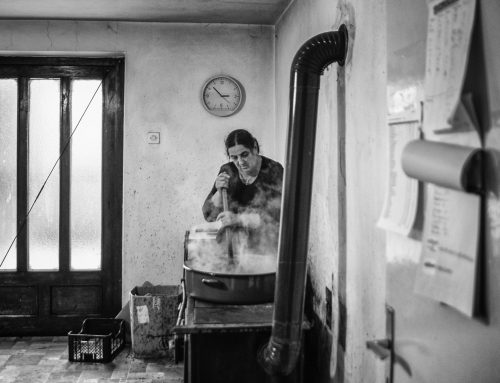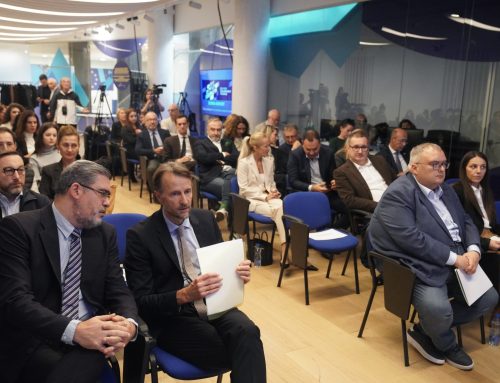Belgrade July 2nd – At the request of the Ministry of Health of the Republic of Serbia, the European Union will finance the hiring of 200 health workers for 6 months in the light of an increase of Covid 19 cases in Serbia. The health personnel will be comprised of medical doctors, medical technicians and administrative staff to support Institutes of Public Health, Primary Health Care Centre Covid Clinics and key Serbian laboratories. This qualified personnel shall be deployed assisting the existing health care staff until the end of 2020 as needed.
Ambassador Sem Fabrizi stated that this was another expression of the EU’s strong support to Serbia in the area of health and the response to Covid 19.
“The EU has assisted Serbia extensively in the Covid 19 crisis and also years before with support for the health sector”, Mr Fabrizi reiterated.
With regard to Covid 19 the EU quickly made available 93 million Euros in March 2020:15 million Euros were allocated for immediate response, while 78 Million euros are allocated to medium term economic recovery.
Looking at the past 100 days after the beginning of the Covid 19 crisis since March 2020 the EU organised 15 cargo planes which landed on Nikola Tesla airport. These planes carried over 721 tonnes of equipment needed to fight corona. The cargo largely consisted of equipment and devices from China and India which were bought by the government of Serbia or donated to Serbia while the EU covered the transport costs in the amount of 7.1 million EUR for the altogether 15 cargo flights. The first flight landed on 26 March and the last on 3 May.
In addition to the transport cost the EU invested an additional 4.9 million into the purchase of medical goods for Serbia such as:
- Protective Medical Face Masks (standard type) (800,000), intended for personal respiratory protection of medical personnel in health institutions, were delivered on 18 April 2020.
- Infra-red thermometers (300) are non-contact handheld cutaneous devices for fever screening during the COVID-19 global emergency. The full contingent was delivered on 17 April 2020.
- Stationary oxygen concentrators (100) improve access to oxygen therapy thus reducing COVID-19 mortality associated with hypoxemia. The full contingent was delivered on 23 April 2020 and was further allocated to health institutions across the country according to needs assessed by the Ministry of Health and the World Health Organisation.
- Containers with furniture for triage and emergency care (100) allow the triage of patients while preventing the access of potentially infected persons to health care facilities. Medical equipment for containers is also provided and consists of a bed for examination, a table with two chairs, a contactless thermometer, smaller containers for medical and infectious waste, and a waste bin.
- A real-time polymerase chain reaction i.e. Real-Time PCR machines (2) and reagents for 2019-nCoV tests (25.000) allow immediate COVID – 19 diagnoses after the test administration. Goods were delivered to Batut and Torlak institutes in Belgrade.
- Intensive care monitors (ICMs) (50) to supplement the existing equipment in the Intensive Care Units (ICU) to meet the increasing number of patients caused by the onset of COVID – 19 who are in need of acute and intensive care. All devices were further allocated to health institutions across the country according to needs assessed by the Government of Serbia.
- Devices for monitoring, ventilation, and anaesthesia (DMVA) (25) for short-term or long-term ventilation support with anaesthetic care of patients suffering from acute respiratory obstruction thus necessary in critical care management of COVID-19. They have been or will be allocated to health institutions in Serbia according to needs assessed by the Ministry of Health and the World Health Organisation.
- Devices for artificial ventilation (respirators) (50) are intended for ventilation support of patients suffering from acute respiratory obstruction, thus necessary in critical care management of COVID-19. All fifty (50) ventilators were further allocated to health institutions in the country according to needs assessed by the Ministry of Health and the World Health Organisation.
The EU also invested aid for the most vulnerable groups during the Covid crisis, in particular the Roma community:
- 100.000 EUR in hygiene and essential foods packages for Roma settlements in 4 towns in Serbia (Belgrade, Nis, Subotica, Valjevo)
- Women and elderly in remote areas:
- 100.000 EUR in hygiene packages to help such vulnerable people in 50 municipalities
- Support for transit centres for migrants:
- 600.000 EUR for blankets, tents, mattresses, pillows, linen, bedsheets, gas heaters, folding tables, etc.
Serbian scientists are now able to test more samples on COVID-19 thanks to a system of referenced laboratories equipped by the European Union. National Reference Laboratory in Batajnica in the past had previously received 7.5 million EUR of EU donations to renovate the complex, equip it with high tech machines and robots, and to provide technical assistance. This laboratory did about 85.000 COVID-19 tests from the end of March until the end of June.
Over the past two decades the EU has equipped hospitals, laboratories, institutes of public health and blood transfusion centres and provided 252 emergency medical vehicles for health centres around Serbia, of which 122 have been delivered with ventilators, which is crucial to fight COVID-19.
More globally, the EU supported Serbia’s whole healthcare network: through the European Investment Bank – the EU Bank – funds in the amount of 250 million euros were used for the reconstruction and construction of 20 large hospitals across Serbia, including the Torlak Institute, which is crucial in the fight against the virus Corona.
Only in 2019 , the construction of a new building and the renovation and expansion of Clinical Center in Niš has been completed. That includes work on existing facilities, new blocks, courtyards and parking spaces. A total of 45,000m2 were reconstructed, and this significant regional health centre received 600 hospital beds, of which 38 were for intensive care and 42 for semi-intensive care. The EIB financed the construction of 34 million euros, while the budget of the Republic of Serbia allocated 16 million euros for the procurement of equipment. Thanks to the assistance of the EU, millions of Serbian citizens have better and more modern medical care, in other cities, too.
The EU made possible the use of new modern surgical operating rooms, emergency centres, a large number of hospital beds, new ambulances and hospital kitchen and hygiene equipment purchased for centres in Kikinda, Pancevo, Sombor, Smederevo, Sremska Mitrovica, Zajecar, Cacak, Krusevac, Pirot and Belgrade.
All information on EU support to Serbia against COVID-19 can be found here: www.euzatebe.rs/covid
For more photos and videos with concrete examples of support of the EU in the health sector click here:
- https://youtu.be/zLpQnKKXEYc
- https://europa.rs/eu-partnerstvo-sa-srbijom-eu-najbolji-partner-i-najveci-donator-vec-20-godina-i-na-prvoj-liniji-fronta-u-borbi-protiv-covid-19/
- https://europa.rs/pirot-dobio-kontejner-za-testiranje-na-covid-19-finansiran-od-eu/
- https://youtu.be/x-QMm_yNywE
- https://youtu.be/4wM_-obHbsQ




